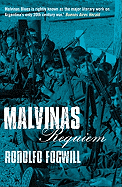

Originally titled Los Pichiciegos (small Argentine armadillos, an endangered species) and published in 1982 as one of the first literary accounts of the Falklands War, this novel has been newly translated as Malvinas Requiem (Argentinians call the Falklands the Malvinas).
It's a punchy, startling, thrilling little book. In spare, elliptical style, as though his lean prose has no time to waste and barely survived the hardships of the war, Rodolpho Fogwill sketches the daily terrors of that deadly June winter, the secret transactions with the Brits, the sheep blown up by landmines, the murderous swarms of helicopters, the spectral nuns haunting the mountainside at night.
Fogwill assumes you know that the Argentine generals were ruthless tyrants, the islands were populated almost exclusively by British shepherds with their flocks and that these deserters are bartering with the Brits to betray their own Argie army.
Tortured and killed if caught by their own, subject to the whim of British mercy or brutality, Fogwill shows you battered Argentine soldiers with promise-filled leaflets in hand being napalmed as they stand in line to surrender.
Not until halfway through the third-person narrative does a mysterious "I" begin to appear, writing down notes, interrogating one of the dillos. Then a window is mentioned--an odd detail very much out of place in an underground burrow. Slowly from these clues a narrator surfaces in his hotel room, recording the testimony of one angry survivor.
It's a dazzling little tour de force that sounds as though it were thrown together as fast as it reads, another brilliantly-written, heartbreaking human document of how we slaughter our children.--Nick DiMartino

